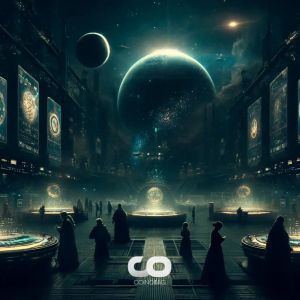Market Pulse
In a significant development for the burgeoning non-fungible token (NFT) market, a federal judge has dismissed a class-action lawsuit against Yuga Labs, the creators behind the iconic Bored Ape Yacht Club (BAYC) collection. The dismissal hinges on the judge’s determination that the ApeCoin-linked NFTs at the heart of the dispute may not qualify as securities under the stringent Howey Test. This ruling marks a crucial moment for regulatory clarity, potentially alleviating some of the long-standing legal uncertainties surrounding digital collectibles and their categorization within U.S. financial law.
The Core of the Lawsuit Against Yuga Labs
The lawsuit, filed by investors, alleged that Yuga Labs had sold unregistered securities in the form of its highly popular Bored Ape Yacht Club NFTs and the associated ApeCoin (APE) token. The plaintiffs contended that Yuga Labs and its celebrity promoters had misled buyers, artificially inflating prices and failing to disclose financial relationships. Central to their argument was the assertion that purchasers of these digital assets had an expectation of profit derived from the efforts of Yuga Labs, a key component of the Howey Test’s definition of an investment contract.
- Allegation: Yuga Labs sold unregistered securities (BAYC NFTs and APE).
- Claim: Misleading investors and artificial price inflation by promoters.
- Basis: Expectation of profit from Yuga Labs’ managerial efforts.
The Howey Test and its Application to NFTs
The Howey Test, originating from a 1946 U.S. Supreme Court case (SEC v. W.J. Howey Co.), defines an “investment contract” – and therefore a security – as an investment of money in a common enterprise with a reasonable expectation of profits to be derived solely from the entrepreneurial or managerial efforts of others. For years, the applicability of this test to the diverse and rapidly evolving landscape of NFTs has been a subject of intense debate among legal scholars and industry participants alike.
In this particular dismissal, the judge signaled that the plaintiffs failed to adequately demonstrate that the ApeCoin-linked NFTs met all criteria of the Howey Test. Specifically, the court questioned whether purchasers had a reasonable expectation of profit solely from the efforts of Yuga Labs, distinguishing between speculation on a collectible’s value and an actual investment contract. This nuanced interpretation highlights the complexities of fitting novel digital assets into existing legal frameworks.
Implications for the Broader NFT Market
The dismissal of this high-profile lawsuit offers a glimmer of regulatory guidance for the NFT ecosystem. While not a definitive, universal declaration that all NFTs are not securities, it provides important precedent for similar cases. For NFT creators, it underscores the importance of carefully structuring their projects and marketing efforts to avoid inadvertently creating an “investment contract” under U.S. law. For investors, it reinforces the need to understand the fundamental nature of their digital asset purchases.
- Increased Clarity: Provides a legal benchmark, particularly for profile picture (PFP) style NFTs without strong “active management for profit” elements.
- Reduced Litigation Risk: May deter future speculative lawsuits against NFT projects, fostering a more stable environment.
- Caveats: The ruling is specific to this case and the specific NFTs/tokens involved. NFTs with stronger utility, revenue-sharing, or explicit promises of future returns tied to developer efforts could still be deemed securities.
- Innovation: Could encourage more innovation in the NFT space by reducing regulatory FUD for certain project structures.
Industry Reaction and Future Outlook
The crypto and NFT communities have largely reacted positively to the news, viewing it as a small victory against overzealous attempts to classify all digital assets as securities. It aligns with the long-held industry view that many NFTs function more akin to art or collectibles than traditional investment vehicles. However, the legal landscape for crypto remains fractured and uncertain. The U.S. Securities and Exchange Commission (SEC) continues to pursue an aggressive enforcement agenda, and other lawsuits involving different types of NFTs or crypto assets will likely yield varying outcomes depending on their specific characteristics.
This ruling does not create a blanket exemption for all NFTs, nor does it preclude future regulatory actions. Instead, it serves as a critical data point, contributing to the slow, evolving process of defining digital assets within existing legal frameworks. The industry will continue to watch for further clarity from courts and legislatures, hoping for a comprehensive regulatory approach that fosters innovation while protecting consumers.
Conclusion
The dismissal of the Yuga Labs lawsuit, particularly its implications regarding the Howey Test for ApeCoin-linked NFTs, represents a significant moment for the digital collectibles space. While it provides a degree of much-needed clarity and a positive precedent for certain types of NFTs, it is not a panacea for the broader regulatory challenges facing the crypto industry. It underscores the judiciary’s ongoing role in interpreting existing laws for novel technologies and highlights the continuing need for clear legislative action to provide a stable foundation for Web3’s future.
Pros (Bullish Points)
- Provides significant regulatory clarity for certain types of NFTs, particularly PFP collections.
- Reduces the litigation risk for NFT creators and projects operating within similar structures.
- Could encourage further innovation and investment in the NFT space by lowering legal uncertainty.
Cons (Bearish Points)
- The ruling is specific to this case and does not provide a blanket exemption for all NFTs from securities classification.
- The SEC or other regulators may still pursue different legal theories or actions against other NFT projects.
- Ongoing uncertainty persists for NFTs with stronger utility, revenue-sharing, or direct investment schemes.



